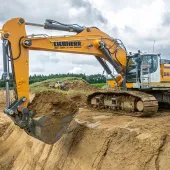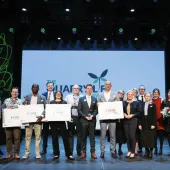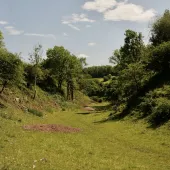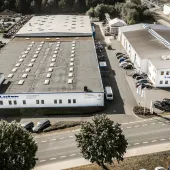2014 Quarry Life Award winners announced
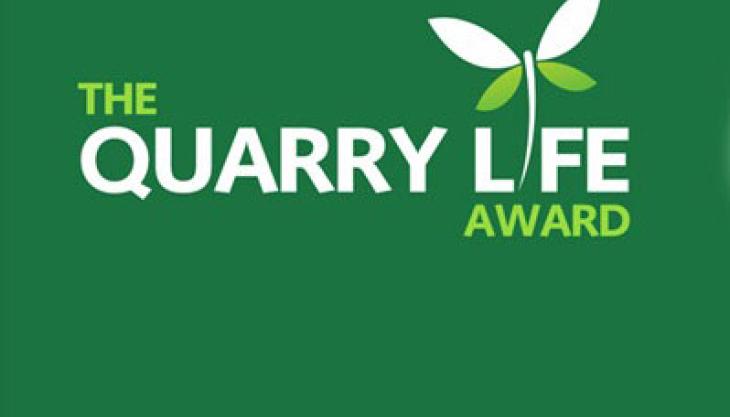
HeidelbergCement honour outstanding projects from around the world that promote biodiversity
ON 9 December 2014, the winners of the International Quarry Life Award were honoured at a festive award ceremony held in Prague. The Quarry Life Award was established by HeidelbergCement to generate innovative ideas for promoting and protecting biodiversity at their quarry sites worldwide.
Almost 400 proposals from 22 countries were submitted in 2014, of which 95 were selected for the competition in five different categories: Biodiversity and Education; Innovation and Biodiversity; Biodiversity Enhancement; Raising Public Awareness; and Student Project.
The best project in each category was awarded €10,000, and a grand prize of €30,000 was awarded to the best project overall.
Describing this second edition of the Quarry Life Award scheme as a ‘resounding success,’ Daniel Gauthier, member of the managing board of HeidelbergCement, said: ‘The Quarry Life Award has generated great enthusiasm among researchers, students, environmental associations, and our own employees. The competition and research projects allow HeidelbergCement to improve their biodiversity management practices as well as share best practice examples with the public. The competition clearly augments our collective knowledge about the biological value of mineral extraction sites.’
The international jury was composed of Mr Gauthier; Richard Grimmett, director for Conservation at BirdLife International; Erasto Mark Njavike, programme manager at Jane Goodall’s Roots & Shoots in Tanzania; Dr Michael Rademacher, biodiversity and natural resources director at HeidelbergCement; and Dr Ulrich Tränkle, director of AGLN, a consultancy for landscape planning and nature conservation management.
The jury bestowed the 2014 Quarry Life Award on the following projects:
Grand Prize
‘A comprehensive inventory of herpetofauna at the Górażdże limestone quarry’ by Edyta Turniak, NATRIX Herpetological Association, Poland. The researchers completed a comprehensive inventory of the reptiles and amphibians living in the Górażdże limestone quarry. They found out that the high degree of biodiversity at the quarry is mainly due to the presence of many amphibian and reptile species. As a consequence, they developed a list of recommended land reclamation practices.
Biodiversity and Education
‘Youth view at quarry nature’ by Diana Prischepenko, Russia. The main goal of the project was to improve youth awareness of biodiversity in quarries through environmental education and raising public awareness. The local community was actively involved in the research project and in the development of a board game based on ecology issues.
Innovation and Biodiversity
‘The use of vermicompost as treatment for topsoil to restore biodiversity’ by Kwasi Boadu Ntiamoah, Ghana. This project aims at converting organic food waste – through vermicomposting – into compost that has the power to restore the fertility of the topsoil in a quarry, and thereby promote biodiversity.
Biodiversity Enhancement (two winners)
‘Research of the biodiversity at the Tovacov lakes’ by Jan Ševčík, Czech Republic. The Tovacov lakes offer habitats for many (protected) plant and animal species. To improve the function and quality of these biotopes, and to increase their current biological value, a set of 17 recommendations were developed.
‘The feasibility of biodiversity enhancements in woodland ground flora around Whatley Quarry’ by David Watson, Bath Spa University, UK. This project examined the feasibility of enhancing woodland ground flora in woodland plantings at Whatley Quarry, in order to improve their biodiversity value.
Raising Public Awareness
‘Community engagement framework’ by Sophie Malkin, Australia. This project provided quarry managers with practical and flexible step-by-step guidance on how to promote effective local community engagement based on best-practice techniques and successful global examples.
Student Project
‘Design and development of suitable spawning grounds for the protection of native amphibians’ by Jürgen Reusch (project leader), Jessen Grammar School, Germany. This project studied the potential spawning waters of native amphibian species at the Steinsdorf gravel pit, and addressed demands to preserve biological diversity coupled with the objectives of restoration.




